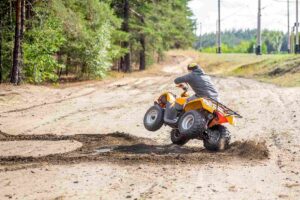
Florida is known for its sunny skies, beautiful beaches, and vibrant outdoor lifestyle. Off-roading on all-terrain vehicles (ATVs) and dirt bikes is a popular pastime for many enthusiasts. But before you hit the trails, you must understand Florida’s laws and regulations surrounding these vehicles.
Along with understanding the laws, knowing what to do if you are involved in an accident is important. If you are in this situation, contact our personal injury lawyer for help.
What Are the Definitions of ATVs and Dirt Bikes in Florida?
Before diving into the laws, it’s important to clarify what ATVs and dirt bikes are, according to Florida law.
An all-terrain vehicle (ATV) is any motorized off-highway vehicle that travels on three or more low-pressure tires, has a seat designed to be straddled by the operator, and is designed for a single operator (§316.2074, Florida Statutes).
On the other hand, dirt bikes are off-highway motorcycles designed for use on unpaved surfaces.
Registration and Titling Requirements
ATVs and dirt bikes in Florida do not need to be registered for off-highway use. However, if you plan to operate your vehicle on public roads, you must obtain an “Off-Highway Vehicle” (OHV) title from the Florida Department of Highway Safety and Motor Vehicles (DHSMV).
To obtain an OHV title, you must provide proof of ownership and a completed application form and pay the appropriate fees. Remember that obtaining an OHV title does not grant permission to operate your vehicle on public roads; it simply allows law enforcement to identify stolen vehicles more easily.
Where Can You Ride ATVs and Dirt Bikes in Florida?
Florida law prohibits the operation of ATVs and dirt bikes on public roads, streets, or highways unless they are registered and meet specific equipment requirements.
However, you can legally ride your ATV or dirt bike on private property with the owner’s permission or on designated off-highway vehicle (OHV) trails throughout the state. The Florida Forest Service manages several OHV parks and trails, which you can find on their website.
Age Restrictions and Helmet Laws
In Florida, no one under 16 may operate an ATV or dirt bike without direct adult supervision. Additionally, all riders under 16 must wear a helmet and eye protection while operating an ATV or dirt bike, regardless of whether they are on public or private property (§316.2074(3), Florida Statutes).
It is highly recommended that riders of all ages wear helmets and other protective gear, such as gloves, boots, and long-sleeved shirts, to ensure their safety while riding.
Liability Insurance and Safety Courses
Florida does not require ATVs or dirt bike operators to carry liability insurance. However, it is strongly advised to obtain coverage to protect yourself and others in an accident. Many insurance providers offer specialized policies for off-highway vehicles, so exploring your options is worth exploring.
Although not mandatory, taking an ATV or dirt bike safety course can benefit riders of all experience levels. These courses can teach you valuable skills and techniques for safe off-roading and provide information on environmental protection and trail etiquette. The ATV Safety Institute (ASI) and the Motorcycle Safety Foundation (MSF) offer courses throughout the United States, including Florida.
Consequences for Breaking the Law
Violating ATV and dirt bike laws in Florida can result in various penalties, depending on the severity of the offense. For example, operating an ATV or dirt bike on public roads without proper registration can lead to a noncriminal traffic infraction and a fine (§316.2123, Florida Statutes). More serious offenses like reckless operation can result in criminal charges and even imprisonment.
It’s crucial to familiarize yourself with Florida’s ATV and dirt bike laws to avoid legal trouble and ensure the safety of yourself and others.
How to Stay Safe and Legal on the Trails
To ensure a safe and enjoyable off-roading experience in Florida, follow these tips:
- Always wear a helmet and appropriate protective gear.
- Obtain permission before riding on private property.
- Stay on designated trails and respect trail signs and barriers.
- Ride at a safe speed and maintain control of your vehicle at all times.
- Avoid riding under the influence of drugs or alcohol.
- Keep your ATV or dirt bike well-maintained to prevent mechanical issues.
- Consider taking a safety course to enhance your riding skills.
What Are Your Rights and Options if Involved in an ATV or Dirt Bike Accident Caused by Someone Else?
Off-roading on ATVs and dirt bikes can be an exciting and adventurous activity. However, it also comes with inherent risks, and accidents can happen.
If you are involved in an ATV or dirt bike accident caused by someone else’s negligence, you may be entitled to compensation for your injuries and damages.
Seek Medical Attention
Your health and well-being should be your top priority after an ATV or dirt bike accident. Even if you don’t feel immediate pain or injuries, seeking medical attention as soon as possible is important. Some injuries, such as whiplash or internal bleeding, may not become apparent until hours or days after the accident. A medical professional can evaluate your condition, diagnose any injuries, and recommend the appropriate treatment.
Gather Evidence and Information
If you can, gather as much evidence and information as possible at the accident scene. Take photos of the damage to the vehicles and the surrounding area. Get the contact information of the other party involved and any witnesses. Document any injuries you sustained, and keep track of any medical bills or other expenses related to the accident.
Contact an Attorney
After seeking medical attention and collecting evidence, your next step should be to contact an experienced personal injury attorney. An attorney can help protect your rights and guide you through the legal process. They can also investigate the accident, gather additional evidence, and negotiate with the other party’s insurance company on your behalf.
File a Personal Injury Claim
If someone else’s negligence caused the accident, you may be able to file a personal injury claim against them. This claim seeks compensation for medical expenses, lost wages, and pain and suffering. Your attorney can help you file the claim and navigate the legal system.
Pursue Compensation through Insurance
If the other party has insurance, you may be able to pursue compensation through their policy. You can file a claim with their insurance company and negotiate a settlement. However, remember that insurance companies are for-profit businesses and may try to offer a low settlement amount. Having an attorney on your side can help ensure you receive fair compensation for your damages.
Consider Alternative Dispute Resolution
If negotiations with the other party’s insurance company are unsuccessful, you may want to consider alternative dispute resolution methods such as mediation or arbitration. These methods involve a neutral third party who can help facilitate a resolution between the two parties. They can be faster and less costly than going to court and help preserve relationships between the parties involved.
Let Our Accident Attorneys Help You if You Are Involved in an ATV or Dirt Bike Accident
ATVs and dirt bikes can provide a thrilling way to explore Florida’s diverse terrain, but it’s essential to understand and follow the state’s laws and regulations to ensure a safe and legal riding experience.
By familiarizing yourself with these rules and taking precautions to protect yourself and others, you can enjoy the exhilaration of off-roading while minimizing the risk of accidents and legal issues.
If you are involved in an ATV or dirt bike accident caused by someone else, knowing your rights and options is important. Your attorney can help you file a personal injury claim, pursue compensation through insurance, or consider alternative dispute resolution methods.
By taking the appropriate steps, you can protect your rights and receive the compensation you deserve.
If you need legal representation, contact our office to schedule a consultation.
